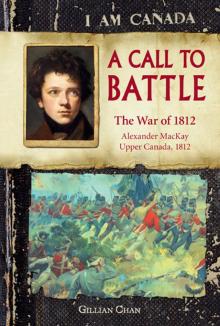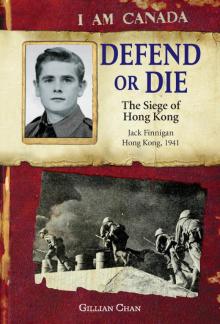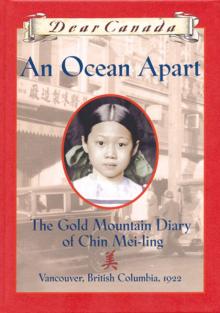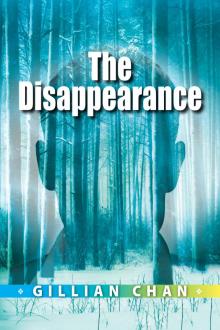- Home
- Gillian Chan
Defend or Die
Defend or Die Read online
This book is dedicated to the memory of all those who fought to defend Hong Kong in 1941, and especially to the men and women of C Force.
Table of Contents
Cover
Title Page
Dedication
Hong Kong Island, January 1942
Toronto, October 1941
North Point Camp, Hong Kong Island, February 1942
Enroute to Capreol, October 1941
North Point Camp, Hong Kong Island, February 1942
At Sea, October–November 1941
Kowloon, Hong Kong, November 1941
North Point Camp, Hong Kong Island, March 1942
Obelisk Hill, Hong Kong Island, December 1941
North Point Camp, Hong Kong Island, March 1942
Obelisk Hill, Hong Kong Island, December 8–13, 1941
North Point Camp, Hong Kong Island, April 1942
Obelisk Hill, Hong Kong Island, December 13–17, 1941
North Point Camp, Hong Kong Island, May 1942
Hong Kong Island, December 18–19, 1941
North Point Camp, Hong Kong Island, July 1942
Hong Kong Island, December 20, 1941
North Point Camp, Hong Kong Island, August 1942
Hong Kong Island, December 21–22, 1941
Sham Shui Po Camp, Kowloon, October 1942
Hong Kong Island, December 23, 1941
Sham Shui Po Camp, Kowloon, November 1942
Hong Kong Island, December 24, 1941
Sham Shui Po Camp, Kowloon, December 25, 1942
Hong Kong Island, December 25, 1941
Sham Shui Po Camp, Kowloon, January 1943
Stanley Peninsula, December 25–26, 1941
Sham Shui Po Camp, Kowloon, January 1943
Epilogue
Historical Note
Images and Documents
Credits
Author’s Note
Other books in the I Am Canada series
Copyright
Hong Kong Island, January 1942
I got lucky today. I was chosen for a work party, the first time I’ve been outside since we were taken prisoner. I don’t know why I was chosen, perhaps because I’m one of the healthiest. Ike wasn’t so lucky. He tried to stand straight when they picked us out at roll call, but he’s still weak and the shrapnel wound on his head hasn’t healed.
Anyway, we had been out clearing roads. Some were still blocked with debris and burnt-out vehicles and on the way back we stopped at a mansion in the hills. I don’t know why we stopped at this one, maybe it was because there was a Rolls Royce in the driveway that looked like it had taken a direct hit. One of our guards went in and when he came back he had a grin on his face like he’d found gold. There was a lot of jabbering and the next thing we knew, we were ordered off the trucks and into the house. Although the house had been hit by artillery fire, most of the damage was external, and inside it was like a palace. I’d never seen such fancy furniture. It wasn’t the furniture they were after though. There was a cellar and it was full of crates of liquor and they had us bring those up and load them into one of the trucks.
Shigematsu was his usual swinish self, kicking and hitting us if we didn’t work hard enough, but there was another guard and he was all right — well, as all right as any of them ever are. After we had loaded the trucks the guard made us look through the rest of the house. The kitchen was a mess of rotting food, mould covering most of it. It looked as if it had been picked clean already, since the shelves of the pantry were bare. We were lucky though, since a few shelves beneath the sink seemed to have been missed and he let us take any tins we found there, making signs that we should be quick and not let the other guards see.
Since we were all starving, we didn’t need telling twice. Simon Easton had on a greatcoat he had scrounged from somewhere — probably from a dead officer. He’s a wily one and he quickly ripped the lining near the armholes and loaded in as many tins as he could, packing them tightly so they didn’t clank. I swear the weight of them made the coat hang at least 4 inches lower. Good job he’s a big guy.
Maybe we were taking too long without anything useful being brought out, but Shigematsu stormed in, yelling at us, herding us out of the kitchen, all the while waving his rifle. He made signs that some of us should go upstairs and search there. I don’t know why. Any clothes we might find weren’t likely to be of any use to him, scrawny little runt that he is. Still, I’ve learned it doesn’t pay to argue with a man who doesn’t speak your language and who has a rifle.
I went up with a couple of others, followed by Shig the Pig — if he knew what we called him we’d be in for a beating for sure. It was hard to move around, as it was obvious a shell had come through the roof, leaving debris for us to clamber over. We had no idea what old Shig wanted us to find, but we were in luck. While I was rifling through a drawer I came across some jewellery hidden inside a sock. If Shig hadn’t been breathing down my neck, I would have tried to palm it and smuggle it out to barter for food through the camp’s wire fence.
Shig leaned forward and grabbed it, giggling like a kid who’d been given a candy bar. He let a rope of pearls cascade through his fingers, then quickly stuffed them and the other pieces inside his pockets. Sneaky little devil. I’d be willing to bet he won’t tell anyone about that find. We moved on to another room, maybe some sort of office or library, and that’s where I found this book.
It didn’t look like much, just a bound, black book lying on the floor. When I picked it up I realized I had hit the jackpot. It was an unused ledger with soft covers. I doubted I would be allowed to keep it, so I hid it in the middle of an armful of books, novels that I grabbed from the shelves around the room. We were starved for any reading material or any kind of entertainment, so if I could persuade the guards to let me take these, I’d be a hero in the camp.
Shigematsu was still smirking, but he was starting to pace as if he was eager to get going. I walked up to him, keeping far enough away so that he couldn’t take a swing at me if his mood changed.
I held the armful of books out, smiling and bobbing my head like an idiot. “Hai? Hai?” I asked, using the only Japanese word I knew. I had no idea what he would do, but he laughed and echoed my “Hai.”
With one truck filled with crates of liquor, there was no way that we could all fit in the remaining empty one, so some of us drew the short end of the stick. We set off on the long walk back to the camp, picking our way down roads still shattered by bombing, the decomposing bodies lying where they’d fallen. The only way through was to try and stare straight ahead, put one foot in front of the other, block out the sights. Both the Grenadiers and my group had fought like devils up in these hills and the last thing we wanted to see was the body of a buddy. No one was talking. That suited me fine. I was thinking what I would do with the ledger when I got back to camp.
I’d hand the books over to the YMCA guy who’d been attached to the Grenadiers. Mr. Porteous would be pleased and add them to the library he was trying to build. I was going to have to be crafty to keep the ledger. I’d need a really good hiding place for it — maybe even rip it apart and keep the pages rolled up and hidden inside my bedstead. I don’t know whether we’re allowed to keep diaries, but I’m not risking a beating or maybe even death to find out. I’ll keep it hidden, because I want to write it all down so that there’s some record of how I ended up in this hellhole and the torture they’re putting us through.
Toronto, October 1941
The platform was swirling with people, all come to make their goodbyes: women alone, whole families. All I had was my brother Tom. I had a sneaking feeling that he was there to make sure I got on the train and was no more trouble to the Finnigan family. He and Ma were the ones who’d managed the deal that
kept me out of jail if I joined up. It helps having a police sergeant for a family friend.
I had only been at Camp Borden long enough to complete my basic training and was just about to start on advanced training when I was sent on embarkation leave, told to make a quick visit home because I was joining the Royal Rifles of Canada, who were going overseas somewhere. My hope was for someplace warm, maybe India, safe from the actual fighting and awash with exotic girls who’d be charmed by a big, handsome Canadian boy.
After all the fuss, I should have known better than to go home for my leave. I didn’t exactly receive a hero’s welcome. Ma was pinch-lipped, forever fretting over what would happen if Alice’s family found out I was back. She didn’t want to let me out of the house. Me, all I wanted to do was to see the gang and sink some pints with them before I was shipped off, not knowing whether I’d ever see them again. I got out, of course, for haven’t I always done pretty much as I please? The wild times were worth the arguments and hand-wringing at home. I have to say that once you put a uniform on, suddenly everyone’s your friend. I hardly had to pay for a drink the entire time — kind of funny when you consider that I actually had a good amount of money for the first time in my life.
So Tom and I stood there on the platform, with nothing much to say. I kept glancing over his shoulder, hoping that Alice might turn up. I’d kept my promise not to see her while I was home, but I’d sent a message through one of her friends that I was shipping out and when I’d be leaving Toronto.
“Shouldn’t you board?” Tom said, looking at his watch. He and I had never got on — he took his role as the eldest of us five far too seriously, particularly since our dad had lit out for parts unknown years ago.
I tried to stall for time, even though I could see that everyone else who was heading to Capreol — some godforsaken place up in Northern Ontario that I had never heard of until I got my orders — had got on the train, even Captain Denison, the Royal Rifles officer who had mustered us here. “Is that the last thing you’re going to say to your brother who’s heading off into the wild blue yonder while you sit back home all snug and cozy with a job that means you’ll never be called up?”
“Keep safe,” was all he said. He picked my kit bag up and threw it up the steps onto the carriage floor. I had no choice but to start climbing the stairs if I wanted to make sure that the bag didn’t get trampled as people milled around, trying to find seats or trying to find friends. I picked the bag up and hesitated in the doorway, craning my neck to see if there was any sign of Alice.
“Jacko!” The voice came from inside the carriage. I could see the rubbery features of my buddy, Ike Caplan, twisted into a broad grin as he indicated a space beside him right by the window. I bulled my way through, using elbows and even my kit bag to get people to move.
“What took you so long?” Ike pointed out the window at Tom, who was still standing there looking miserable. “That your brother? You two look alike, but it didn’t seem as if you were exactly chewing the fat out there.”
“Yeah.” I sighed. “He thinks I’m a disgrace to the family. Can’t wait to see the back of me.”
“Uh-oh.” Ike’s grin broadened. “Is this to do with the guy you beat up? Some girl’s brother that you put in hospital?”
I couldn’t help smiling, remembering the satisfying crunch when my fist pounded into Brian Lang’s nose, the way blood bloomed across his cheeks. I was so mad that he had tried to intimidate me into giving up Alice. If Sergeant Donaghue hadn’t come along and broken up the fight, I’d have done a lot more damage to Brian. According to Tom, I was lucky that it was Donaghue, for he knew both families, and when Brian was still in the hospital he managed to persuade the Langs into not pressing assault charges so long as, one, I didn’t attempt to see Alice again, and, two, I joined up. No one listened to my side of it, not even when I told them that it was a bit rich — me getting punished when it was Brian and his bully-boy buddies who’d jumped me. Was it my fault that they were such wimps I took out the three of them single-handedly?
“You got it in one,” I said, beginning to lower myself into the seat. I stopped in mid-air as a flash of emerald green caught my eye. I knew that colour all too well. It was Alice’s winter coat and she was running towards the train.
I launched myself out of the seat and made for the door. It was still open. I had a chance. I could hear the whistle blowing and the doors being slammed shut down the length of the train as the wheels began turning.
I didn’t care. If it meant I got in trouble, got put on a charge for being AWOL, I was going to get off that train and see Alice. She’d come.
Just as I reached the door, it slammed shut in my face. Through the window I saw Tom hop neatly down from the steps and stop Alice, both hands on her shoulders. I tried to wrestle the door open, but the train was getting up to full steam and all I could do was watch as they faded into the distance. I did have time to see that Alice was crying. Damn Tom!
North Point Camp, Hong Kong Island, February 1942
I can’t believe I wrote so much. My old grade nine English teacher, Moth-eaten Mossy, would be laughing his socks off if he knew. He never could get me to write more than half a page for any essay. But how would he know where I am? I suppose he might. The arrival of the Canadian troops to defend the colony of Hong Kong was big news here, and probably back home too. If I had it, I’d bet a million dollars that no one back home even knows whether we’re alive or dead. One guy who’d been in hospital turned up after most people thought he’d died.
Is anyone back home worrying or crying about me? Does Alice think about me?
All the Canadians are together now, prisoners here in North Point Camp. Those of us captured after that last stand on the Stanley Peninsula have been here from the beginning, but the others were taken over to our old barracks at Sham Shui Po, which is now the main Japanese prison camp, before being brought back here. I like it better this way. Our own officers aren’t so bad, but those British ones are the limit. I’m glad we don’t have to deal with them any more. I had enough of them to last a lifetime during the fighting. It’s not easy to find a safe time to write either. Ike keeps watch for me and whistles when he spots a guard coming.
Enroute to Capreol, October 1941
I was poor company for that journey to Capreol, all sulks and grunts. Ike stuck it out for a while, but soon he headed off to find a card game. I stared moodily out of the window, watching the endless trees as we headed farther north than I had ever been before. Not even arriving at our destination cheered me up, even though I was eager to get off that blasted train, stretch my legs. Being tall has its good points, but not when you’re crammed onto a train for hours on end.
The train we were meeting, the one carrying the battalion we were joining, hadn’t arrived at Capreol, so we all piled off the train and that was when I met him for the first time: Sergeant William Bloody Oldham.
Everyone has heard of love at first sight, but there can be hate at first sight too.
It was like that with me and Sergeant Oldham.
We were all milling around, not quite sure what to do with ourselves. I was busting for a pee. There were always long lineups for the johns on the train, so I’d been holding it in and I reckoned I couldn’t much longer.
“Ike,” I whispered, “cover for me. I’m going to head into the bushes for a quick pee.”
“Okay,” he said, “but hurry up. There’s bound to be someone down giving orders soon.”
Well, you know what it’s like, once you start you can’t stop. I felt like I was peeing like a horse. Then I felt it, a rumbling in my stomach, and I just had time to crouch down and stick my bare arse out before liquid crap came cascading out. I prayed that it wouldn’t spatter and that there was no poison ivy hiding under the thick covering of fallen leaves. I heard orders being yelled, but there was nothing I could do to hurry things up.
It was maybe five minutes before I tried to trot discreetly back. The other train had arrived now
and there were more people, so I was hoping I could sidle back in line without anyone knowing I’d been gone.
The guys were lined up along the track, quivering as they stood to attention, and being bellowed at by this scrawny old-timer with a British accent. He was an old army type, all bristling moustache, red face, looking like he was nothing but stringy muscle and bone.
“We’re one man short, boys. Do you think I’m too stupid to count?” He glared at them. “Who is he and where is he?” He paced as he shouted, coming to a dead halt in front of Ike when he started to stutter out a reply. The sergeant leaned in and Ike froze, a look of terror on his face.
I did the decent thing. I stepped forward from where I had been skulking at the end of the line nearest the scrub. “It’s me, Sarge, Rifleman Finnigan. I got caught short, and then I had to take a crap too. You know how it is?” I ended, my voice trailing away as he galloped over to me.
A few smothered snorts of laughter caused the sergeant’s head to spin round as he searched for the culprits. Turning back to me, he looked me up and down as if I was something he had found on the bottom of his boot.
Close up, he was even uglier than I’d first thought. His moustache was reddish, and over the years the sun had baked what must have once been a mass of freckles into skin the colour of brick dust.
I knew what he was up to. For a lot of these older guys it was all about making themselves look important at the expense of us young ones. I hate games like that, always have. Teachers, policemen, NCOs — give ’em a little power and it goes to their heads. Ma reckons that because of Dad taking off when I was a kid, I’m too used to getting my own way, being the youngest in the family. She says I have no respect for those in authority. I won’t argue with that. I figure you judge a man by how he behaves, not by his rank or position.
When Oldham started up again, I was stunned by the noise he was capable of producing. “Stand to attention, Rifleman!” He thrust his face forward. It would have been more intimidating if he wasn’t a foot shorter than me. All it meant was that he was inches away from my chest as I scrambled to follow his order. “Show some respect.”

 A Call to Battle
A Call to Battle Defend or Die
Defend or Die An Ocean Apart
An Ocean Apart The Disappearance
The Disappearance